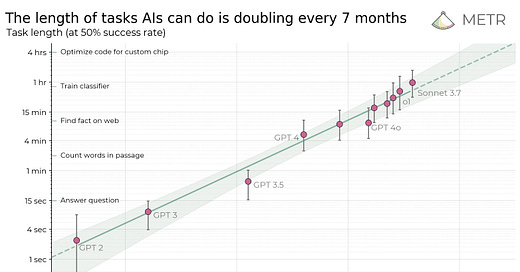Have you ever had one of those little pieces of information come at you out of nowhere and knock you on your ass? Things that reframe how you think about the world. Tidbits like:
The pyramids were older to Cleopatra than she is to us
All gold and silver in your jewelry was made in supernovae
There are multiple infinities and one infinity is bigger than the other
Sharks pre-date trees
GPS works because engineers pre-offset every satellite clock by 38 microseconds per day; skip that and your phone’s position would drift over 10 km each day because of time dilation based on relativity
Shuffling a deck of cards once creates an order never before seen in the universe
All bananas you eat are a clone of a single handful of dwarf Cavendish bananas cultivated in a greenhouse in England from the 1830s
Your current iPhone (2021 or beyond), if released in 2009, would have made it onto the top 500 list of all supercomputers in the world
Ok that was too many, but too fun.
This chart is like that. Ready? Here it is:
LLMs aren’t just getting smarter, they’re also getting more disciplined. Where once they were only able to conquer very short tasks, now they can plan and execute on much larger tasks. We’re crossing a threshold from “interesting tool” to “kind of an employee”. An AI can take on a task that would take a human an entire hour and knock it out in a minute or less.
Assuming this trend holds, we’re 2 years away from an LLM being able to tackle more than 8 hours of human work. We’re 2 years away from being able to task an AI to go off and tackle a day’s work for a person before checking in. And then the AI will go do it in a small fraction of the time.
This is what an Agent actually is.
It’s an LLM in a closed loop with access to one or more tools, access to some outside resource, a long-term goal, and a utility function.
Sounds a lot like an employee to me.
Agents are a big deal because they replace human labor. Task length is a big deal because it tells us how close we really are.
This is the new Moore’s Law of the entire computer industry: how much human equivalent labor can we outsource to these systems? The secret of Moore’s Law was that it wasn’t a measurement capturing technical progress; it was a promise and a social construct. Moore’s Law drove their investment cycles, their Capex spend, their profit expectations. It was a self-fulfilling prophecy the chip industry felt obligated to strive for
Task length will do the same thing, driving everything from training schedules to GPU purchases, defining product roadmaps and power upgrade cycles. The doublings will continue because the industry expects them to. This is the new social contract and it gives us a picture of the profit mechanism too. The closer AI companies get to replicating human labor, the closer they get to the magical profit bullseye where fixed human capital costs become marginal. Companies will plan workforce transitions around predictable AI capabilities. Workers will make career pivots based on whether their particular tasks become automatable. Task length will reshape how we think about human labor.
This is going to happen. It will start with computer-based labor that can be captured in less than a day. Then it will scale up - we’re only 2 years away from a single day of labor, and less than five years away from 3-4 week projects. The next bonanza will be the effort required to translate other labor into AI-legible tasks. Specialized hardware, analog systems, physical world systems.. these will all get interfaced so the AIs can take them over.
We’re 5-10 years away from most human labor being handled by computers.
In that new world your resume is irrelevant.
In that world 'productivity' is not a virtue.
In that world, the question 'what do you do?' is now 'what do you choose to do?'
In that world, direction matters far more than effort.
In that world, questions matter much more than output.
Most people haven't started thinking about this yet.





